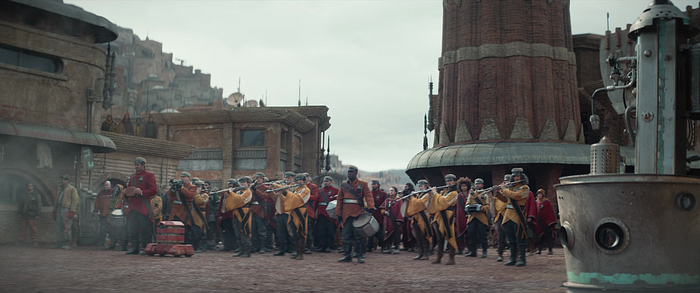Last time I thought a lot about sentimentality as Andor escaped from space-prison.

This is how Andor leaves us for now, and it’s in a typically idiosyncratic fashion. These final two episodes are more of a coda than a climax, as most if not all of the remaining tensions of the previous ten episodes are released and the main story is pared back to where it was nine episodes ago: Andor is leaving Ferrix and all his material attachments behind, to join the Rebellion with Luthen. Like Luke in A New Hope, Andor has been radicalised by the actions of the Empire and his personal loss, and is ready to give his life to the cause this bearded mystic represents — and so he does.
Having watched (until now) the indicated groupings of Andor episodes in batches, I watched these two week-to-week, feeling like the serialisation of the show had finally broken banks and flooded. I’m not sure if that’s the case, if Andor is now more TV than film, but I still wish I’d watched these two together. Episode 11 is mostly moving the pieces into place to make Episode 12 happen, with the exception of Luthen’s high tech escape from the tractor beam, a small moment of traditional Star Wars cool that’s almost (but not quite) in danger of spoiling Andor’s low-stakes mood.
Andor himself is mostly out of the way across the two episodes, listening to a beautiful rendition of Chapo Trap House on his space-iPod and getting trapped in a sticky white web by some aliens whose car he was trying to space-hijack. He has learned that his mother has died, though, and against advice heads back to Ferrix for the funeral. Diego Luna has had ten episodes in which to teach us the face Cassian Andor makes when he is in pain, and that effort pays off here.

The big finale of these two episodes is the funeral riot on Ferrix, which proceeds in a true-to-life fashion from a mood of elevated tension, elite contempt, over-policing and flashpoint violence, before immediately becoming a mad dangerous crush. The Empire tactically loosened its grip on the people of Ferrix, and pays for it in all the accumulated retribution and resentment that are hurled back, alongside a pipe bomb. The industrial construction on the Death Star, glimpsed in a somewhat superfluous post-credit sequence, is mirrored here in the unsteady hands of a young man piecing together this improvised explosive, the explosion of which is another triumph in Andor of making small-scale action impactful and terrifying.
Having assembled all our main characters here, instead of having them play off each other we simply see how they react to the chaos, with (by turns) Luthen being distressed by it, Cinta taking it as the cover for tactical violence, Imperials of all stripes making terrible mistakes and misjudgements — most notably the officer who sends a single man to take a spiral staircase bell tower, but also Dedra in particular is unprepared for a situation in which she has to self-preserve. Syril on the other hand, despite all his other wretched qualities, takes the opportunity to be a hero of sorts. Andor, who has been in this situation far too often lately, sticks to the plan. Mon Mothma is blissfully unaware of any of this.
The marching band sequence that leads up to the funeral and speech, and disorder thereafter, is striking and beautiful, drawing on the shared culture of real-world mining communities and treating them with respect. In the heist episodes we saw how Empire’s power can be brought to bear to clear people from their historic land and exterminate their culture; here we see the action through which a culture can reassert itself back against Empire.

In the final episode the show lurches to a halt whenever it has to cut back for the remaining Coruscant scenes, brief though they are — though Mon Mothma suggesting indirectly to the ISB that her husband might be the cause of all that missing cash is a typically smart story moment, and her daughter running a Mishima-esque traditionalism cult for her schoolmates is deeply funny.
The other notable scene on Coruscant is also strong. Dedra having found herself exactly where the action isn’t in the fight against the rebellion is funny, follows the dog-eat-dog rules we have seen in force at the ISB already, and is neat foreshadowing for how badly her show of force is about to go. Dedra and Syril both came to Ferrix to conquer and leave it bruised. Best for your career prospects to stay in the Imperial centre and watch from afar.

Time gives the ability for a character to blossom and Dedra’s villainy is stronger for having had the time over these episodes to first pull you in with her girl-boss rise to acclaim and then push you away again with the reality of the character’s underlying fascism. It’s true that great movies can establish a character with such depth in a handful of scenes — it’s also true that the worst ones try and fail. Andor has luxuriated in the time taken to flesh out these characters.
Andor’s mother, too, benefits in this way. It would be rote for a character who we only saw passive in life to speak posthumously of revolt. It would be better to see her feel that first spark of rebellion, so that we know what motivated her to want to fight back. But in having the time allocated to a TV show, Andor can have us know Maarva first, know the aspects of her character, and have us realise along with her that she has always been in rebellion. And that she’d want her cremated remains in the form of a brick be used to take someone’s face off.

I was pleased that the “Luthen wants Andor dead plot” was both not compromised on (he really did want him dead) but also not dwelled on, set up only for the crushing final scene in which Andor, like Kino just a few episodes ago, has nothing else. One way out. Through the rebellion, or death.
The strand of plot between Vel and Cinta is thus left to lie, with a few scenes stressing how Vel’s pampered mores are clashing with Cinta’s fervour but not much else, save for a stunning shot of Vel running into the chaotic fog of the funeral uprising which in all honesty justifies their presence all by itself. It’s an odd loose end for a show that has otherwise avoided them at all costs though.
Andor is over then, for now. I’ll be interested to see if it can remain this good in the wake of critical success — I’m certainly hoping so. Much of my writing about Star Wars over this year has been grappling with the idea of what ‘good Star Wars’ is or should be, and this season of Andor is the most compelling argument that it can exist at all.
The fashion in which the series leaves off here is sufficient that it could lead into the (hacked, chopped up) events of Rogue One just fine. It’s always been enough to just place Andor in the company of characters in the nascent Rebellion and say “that’s how it happened”. So it comfortably allows a second season to succeed or fail on its own merits, unnecessary as a continuation of this story. Andor has, stray plots aside, come to a conclusion here.

Andor being good has catastrophically unbalanced my ranking system so I’m going to abolish it.
Chronologically, if you want to follow me on my Star Wars adventure:
- Obi-wan: Episode 1
- Obi-wan: Episode 2
- Obi-wan: Episode 3
- Obi-wan: Episode 4
- Obi-wan: Episode 5
- Obi-wan: Episode 6
- The Phantom Menace (video essay)
- Andor: Episodes 1, 2, 3
- “Can Andor save Star Wars from itself?” Andor: Episodes 4, 5, 6 (supplemental)
- Andor: Episode 7
- Andor: Episodes 8, 9, 10
- Andor: Episodes 11, 12
If you like my writing, please subscribe to my Letterboxd reviews or watch Sixteen attempts to talk to you about ‘Suicide Squad’, available on Youtube now.
